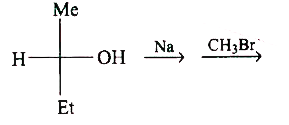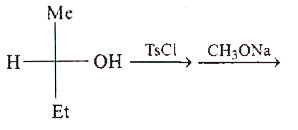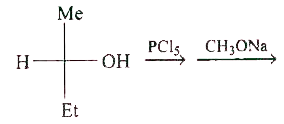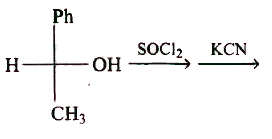Which of the following proceeds with decrea se in entropy?
Boiling of an egg
Combustion of benzene at 27∘C
Dissolution of sugar in water
Calcination of solid CaCO3
The correct Answer is:B
To determine which of the following processes proceeds with a decrease in entropy, we need to analyze each option based on the concept of entropy, which is a measure of the disorder or randomness of a system.
1. Understanding Entropy:
- Entropy (S) is a measure of the disorder or randomness of particles in a system. Higher entropy indicates greater disorder, while lower entropy indicates more order.
2. Analyzing Each Option:
- Option 1: Boiling of an Egg:
- When an egg is boiled, the proteins in the egg unfold and change from a more ordered state (raw egg) to a less ordered state (cooked egg).
- This process increases the disorder of the system, leading to an increase in entropy.
- Option 2: Combustion of Benzene at 27°C:
- During combustion, energy is released, and the temperature of the system increases.
- Higher temperature corresponds to higher average kinetic energy of particles, which increases their randomness. Thus, the entropy of the system increases.
- Option 3: Dissolution of Sugar in Water:
- When sugar dissolves in water, the solid sugar (which is more ordered) becomes dispersed in the liquid (which is less ordered).
- This results in an increase in disorder and therefore an increase in entropy.
- Option 4: Calcination of Solid Calcium Carbonate:
- Calcination involves heating calcium carbonate, which breaks it down into calcium oxide and carbon dioxide gas.
- The gaseous state has much higher entropy than the solid state due to greater particle movement and disorder, thus increasing the entropy.
3. Conclusion:
- Among the options analyzed, the only process that results in a decrease in entropy is the boiling of an egg. Therefore, the correct answer is:
- Option 1: Boiling of an Egg.
- Entropy (S) is a measure of the disorder or randomness of particles in a system. Higher entropy indicates greater disorder, while lower entropy indicates more order.
- Option 1: Boiling of an Egg:
- When an egg is boiled, the proteins in the egg unfold and change from a more ordered state (raw egg) to a less ordered state (cooked egg).
- This process increases the disorder of the system, leading to an increase in entropy.
- Option 2: Combustion of Benzene at 27°C:
- During combustion, energy is released, and the temperature of the system increases.
- Higher temperature corresponds to higher average kinetic energy of particles, which increases their randomness. Thus, the entropy of the system increases.
- Option 3: Dissolution of Sugar in Water:
- When sugar dissolves in water, the solid sugar (which is more ordered) becomes dispersed in the liquid (which is less ordered).
- This results in an increase in disorder and therefore an increase in entropy.
- Option 4: Calcination of Solid Calcium Carbonate:
- Calcination involves heating calcium carbonate, which breaks it down into calcium oxide and carbon dioxide gas.
- The gaseous state has much higher entropy than the solid state due to greater particle movement and disorder, thus increasing the entropy.
- Among the options analyzed, the only process that results in a decrease in entropy is the boiling of an egg. Therefore, the correct answer is:
- Option 1: Boiling of an Egg.
Topper's Solved these Questions
- THERMODYNAMICS & THERMOCHEMISTRYBOOK - VMC MODULES ENGLISHCHAPTER - THERMODYNAMICS & THERMOCHEMISTRYEXERCISE - Impeccable
48 Videos
- THERMODYNAMICS & THERMOCHEMISTRYBOOK - VMC MODULES ENGLISHCHAPTER - THERMODYNAMICS & THERMOCHEMISTRYEXERCISE - Enable
49 Videos
- THERMODYNAMICSBOOK - VMC MODULES ENGLISHCHAPTER - THERMODYNAMICSEXERCISE - JEE ADVANCED (ARCHIVE)
44 Videos
Similar Questions
Knowledge Check
Which of the following reactions proceeds with retention of configuration ?
A B
B C
C D
D
Which of the following expressions regarding entropy is not correct?
AΔSsystem=qTBΔSsystem=ΔStotal+ΔSsurroundingCΔS=ΔSfinal−SinitialDΔStotal=ΔSsystem+ΔSsurrounding
In which of the following cases entropy decreases?
View SolutionWhich of the following parameter decreases as succession proceeds?
View SolutionMatch the following processes with entropy change

View SolutionWhich of the following possesses higher entropy:
(1) Gaseous substance
(2) Liquid substance
View SolutionWhich of the following molecules does not have zero entropy even at zero kelvin? CO,CO2,NaCl,NO
View SolutionIn which of the following entropy increases?
View Solution
